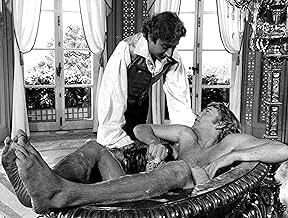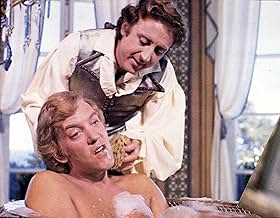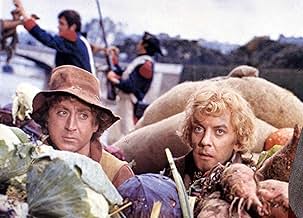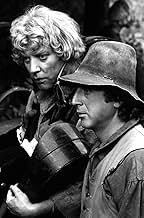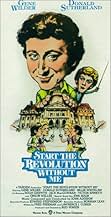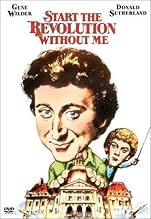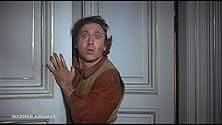Zwei Haudegen kommen selten allein
Zwei nicht übereinstimmende Gruppen von eineiigen Zwillingen, ein Aristokrat, ein Bauer, tauschen am Vorabend der Französischen Revolution fälschlicherweise ihre Identität aus.Zwei nicht übereinstimmende Gruppen von eineiigen Zwillingen, ein Aristokrat, ein Bauer, tauschen am Vorabend der Französischen Revolution fälschlicherweise ihre Identität aus.Zwei nicht übereinstimmende Gruppen von eineiigen Zwillingen, ein Aristokrat, ein Bauer, tauschen am Vorabend der Französischen Revolution fälschlicherweise ihre Identität aus.
- Regie
- Drehbuch
- Hauptbesetzung
- Auszeichnungen
- 1 Nominierung insgesamt
Empfohlene Bewertungen
This movie has it's own unique flavor of comedy while still being reminiscent of great films like "Catch 22," and "Help!" (Maybe it's the appearance of Orson Wells and Victor Spinetti that does this for me...)
There's much more than just slapstick to be had here. Definitely worth the look.
This is a must see for anyone excited by classic slapstick-style comedy.
"Revolution" is in the same league as the Zucker Brothers. It's gags gain momentum as the movie unwinds, until it's whipping around during the last few scenes almost out of control, yet marvelously in control.
This is a movie that has Gene Wilder at his comic peak. He's pre-Wonka and pre-"FrankenSTEEN" here, and hasn't found temperance in his angry hysteria. I've watched this movie close to 15 times, and I can't handle myself when Wilder is galloping around with his stuffed falcon. And the gags in his marriage! "Bring the leather and the honey ... " (His character's wife looks at the camera with a look of worry).
Donald Sutherland is reserved, but he's not well known for his comedy. Yet he has excellent moments, especially in strangling adversaries on the dock with one hand! "...and I shall be the Queeeeen!" The funniest pieces here are actually the lines. Read the quotes! Oh my, a gold mine!
I've long thought this to be the perfect period comedy and wondered why it didn't have universal appeal. Perhaps it's difficult for many viewers to fully embrace an old style costumed spectacle as debacle - events taking place about 200 years ago have the smell of a historical lesson and moviegoers tend to avoid classes when picking out a film. But what if a film throws out much of what we think as historical in favor of a hysterical plot playing on the age-old tensions between the poor and the rich? (the peasantry & the aristocracy). Most of the actors here are usually winking slyly during their performances - they're not really immersing themselves in the period. The exception may be Spinetti as the villainous d'Escargot; he does seem a product of his time while everyone else concentrates on making the gags and clever dialogue as rich and enjoyable as possible. But even this works in the film's favor: the villain is played kind of straight (if you don't count his very odd attempts at metaphor), stuffy and consumed by his plots and intrigue, as the others sort of roll their eyes at the absurd turns in the story.
But why is this perfection? The reason has to be Gene Wilder. Wilder had many great comedic roles in his career but this is my personal favorite. He plays two characters in this one (as does Sutherland, almost as great), an arrogant 'aristo' and a sneaky but timid peasant. Wilder's Philippe de Sisi, the high bred one, has to be seen to be believed. Born a peasant but raised as 'superior,' Philippe is prone to wild mood swings and berserk rages. He's quite insane and Wilder turns him into the craziest, most spellbinding character ever committed to celluloid. Very early in the film, the audience begins to wonder what nutty monologue or wacky stunt the unpredictable Philippe will pull in the next scene. It's probably this performance that made Mel Brooks realize Wilder would be the ideal lead actor for all his films ("Young Frankenstein," etc.).
The rest of the cast in this revolutionary comedy are top notch, as well. Sutherland, as mentioned, is terrific - his two characters were both meant to be nobility - he has that aristocratic air down pat. All the others also understood the sly, sometimes subtle farcical elements of this piece. Many of the confrontational scenes, with the eccentric turns of phrase, are instant classics - it's a shame not more film viewers are aware of them. The sets and costumes are great - much of this takes place in the palace of King Louis and everything looks quite authentic. I also don't have any problems with the ending as some others do. It just delivers on the already fantastic absurdity we've come to realize the entire film is embedded with.
The wife of the noble version of Gene Wilder is also priceless, forever dressing up in costumes in vain efforts to satisfy his somewhat odd collection of sexual fetishes.
But the real reason to see this gem is Hugh ("I thought it was a costume ball") Griffith as King Louis. He outclasses anyone within walking distance, even the great Sutherland. And absolutely effortlessly. The device that uses Orson Welles may or not work -- you have to decide. (Don't be too hard on Orson -- this was from the "We will serve no wine before its time" phase of his career.) But if you come across this on cable late some night, have a good time. It's obvious everyone who made the movie did.
Wusstest du schon
- WissenswertesGene Wilder already was adept with a sword from his days on his college fencing team.
- PatzerTwentieth century buses visible on a bridge in background of swordfight.
- Zitate
Duke d'Escargot: What brings you to Paris?
Claude: Oh, you might say a little business...
Charles: ...and a little pleasure.
Duke d'Escargot: Which do you prefer? Business, or pleasure?
Charles: Well that depends on what you regard as business.
Claude: And, what you may regard as pleasure!
Duke d'Escargot: In Paris we say, business is pleasure.
Charles: And to us, pleasure is our business.
Duke d'Escargot: Then your business should be a pleasure, making my pleasure a business.
Claude: Unless, some mistake business for pleasure. While others know no business but pleasure.
Duke d'Escargot: In that case sir I will show you my business.
Claude: My pleasure.
- VerbindungenEdited into The New Erotic Adventures of Casanova (1977)
Top-Auswahl
- How long is Start the Revolution Without Me?Powered by Alexa
Details
- Erscheinungsdatum
- Herkunftsland
- Sprache
- Auch bekannt als
- Start the Revolution Without Me
- Drehorte
- Paris, Frankreich(Cathedral of Notre Dame)
- Produktionsfirmen
- Weitere beteiligte Unternehmen bei IMDbPro anzeigen


